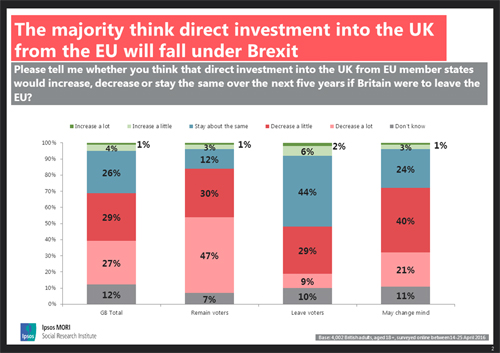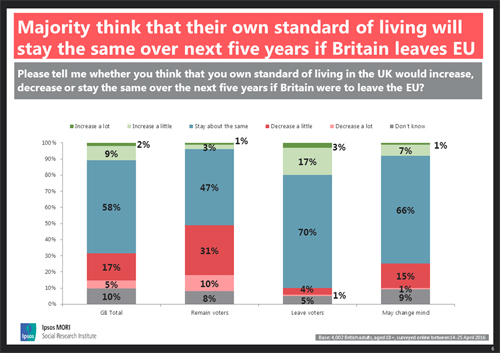Six in ten Britons think their standard of living won't be affected by Brexit
- Majority think investment into the UK from the EU will fall if Britain leaves the EU, but two-thirds don’t foresee any negative personal financial impact from Brexit
- Leave voters less likely to change views when told Brexit would cost them financially while more remain voters shift when told they would be financially hit by staying
A new Ipsos study published today finds the public is not optimistic about levels of EU investment in the UK or its ability to export to the EU over the next five years if Britain votes to leave the EU in next month’s referendum.
The survey of more than 4,000 British adults is the latest in a unique longitudinal study which looks to track how individuals’ views change over time. The latest wave finds the economic arguments seem to have taken hold with the public; a majority (56%) think direct investment into the UK from the EU will fall over the next five years if Britain leaves the EU. Only one in twenty (5%) think that EU investment will increase and three in ten (29%) think it will stay the same. Even among leave voters opinion is mixed - almost four in ten (38%) think investment will fall, 44% think it will stay the same and only eight per cent think it will increase.

When considering UK exports to EU member states, almost half (46%) of those surveyed think these will decrease if Britain leaves the EU. A lower proportion (39%) thinks that the level of exports will stay the same, and only six percent thinks exports to the EU will increase with Brexit. On the other hand, over four in ten people (44%) agree that Britain will be in a strong position to negotiate free trade agreements. This compares with 27% who don’t think this will be the case and 38% who are unsure. The vast majority of leave voters (78%) agree Britain will be able to negotiate free trade agreements with the remaining EU members.
However, there is uncertainty about the impact on unemployment if Britain leaves the EU. Three in ten (29%) think unemployment will increase compared with one in four (25%) who think it will fall, while over a third (36%) think unemployment levels will stay the same. One in ten (11%) leave voters think that unemployment will increase with if the leave vote prevails. Young people (aged 18-34 years) are most likely to think leaving the EU will have a detrimental impact on unemployment.
But while there are signs that people expect the economy to be worse off in the five years after a vote to leave the EU, people don’t necessarily think their own standard of living would suffer. The majority of the public (58%) thinks that their own standard of living will stay the same over the next five years if Britain leaves the EU. Very few people (11%) think it will actually improve compared with the four in five who think it will either stay the same (58%) or decrease (22%). Again, it is young people (aged 18-34 years) who are most likely to think leaving the EU will decrease their standard of living (25%) compared with those aged 55+ years (17%).

The survey also presented respondents with a series of scenarios about how their personal finances might be better or worse off if Britain leaves the EU. This finds, as has been the case for other issues, such as immigration, remain voters appear less committed to their views. After being given a series of escalating scenarios, 13% switch their position to vote leave when told they would be better off by £500 under Brexit. Additionally a sizeable group - four in ten (41%) - become unsure about which way to vote.
The study finds leave voters are a more steadfast group. When told that they could be personally worse off by up to £500 per year if Britain left the EU, the majority (60%) still say they would vote to leave. Only seven per cent say they would switch their vote to remain whereas three in ten (32%) became unsure about which way to vote. This level of uncertainty is higher than when this group was asked about decreasing levels of immigration where the figure was 24%. This suggests that the economic rather than immigration arguments are likely to have more resonance with this group of voters.

Bobby Duffy, Managing Director of Ipsos Social Research Institute, said:
“The twin issues of immigration and the economy have dominated the referendum campaigns so far. The received wisdom has been that messages around controlling borders and sovereignty are the ones which resonate with people who want to leave the EU, but this study shows that the issue of how Brexit could affect individuals financially is more likely than immigration to cause uncertainty in how they would vote. So whilst the rhetoric in the leave campaign has focused on more abstract concepts of self-determination, the arguments about cash in pockets seems more likely to impact on Brexit voters.”Technical Note Ipsos interviewed a representative sample of 4,002 British online adults aged 18+ between 14 -25 April 2016, with funding from Unbound Philanthropy. Interviews were conducted on Ipsos’ online panel and results have been weighted by demographic factors to represent the British population.



